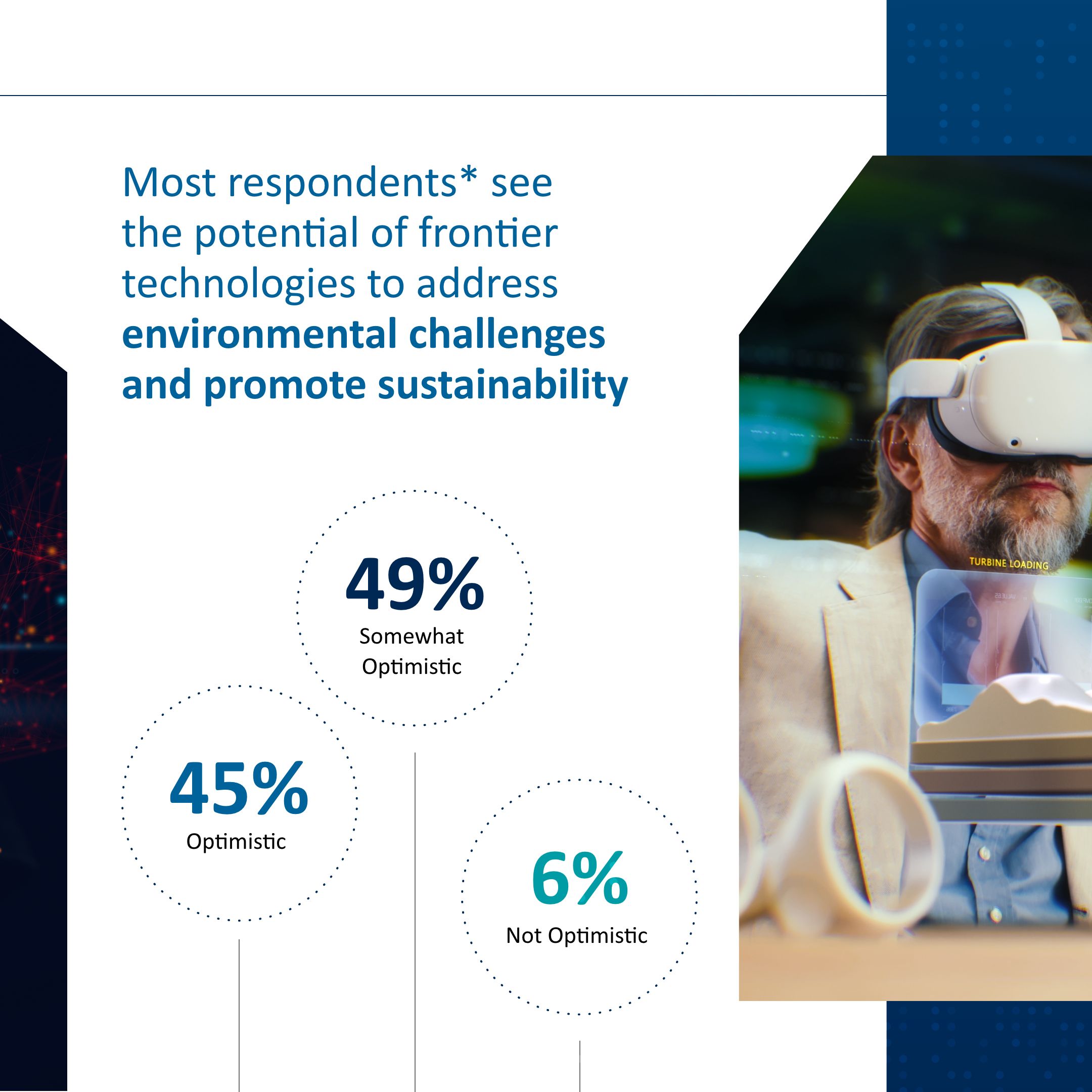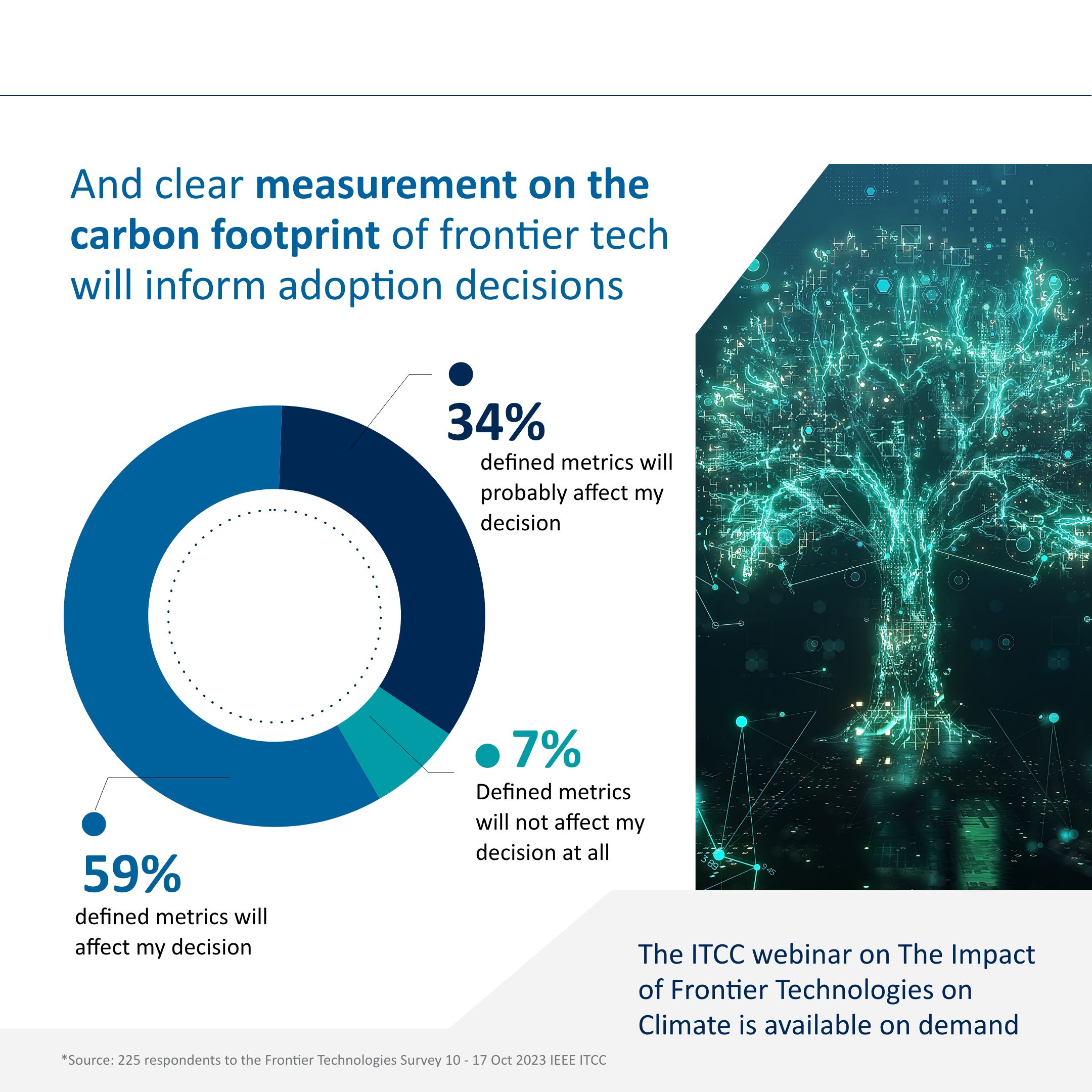Summary
Frontier technologies like generative AI and blockchain are often considered energy-intensive, with the energy consumption of blockchain-based currencies notoriously exceeding that of many countries. However, these technologies can also be invaluable tools in mitigating climate change. Read further to learn how emerging technologies can help reduce the effect of climate change and at the same time have their own carbon footprint.
Both lauded and criticized, frontier technologies are at the border between the laboratory and real-world implementation, designed to disrupt and bring change. They are starting to find applications and transform every sector, from energy to entertainment. Interestingly, climate champions such as the UN itself are experimenting with blockchain to track carbon emissions.
These technologies, which include quantum computing, digital twins, and the latest advances in AI, blockchain, robotics, extended reality, and the Internet of Things, could support the reduction of CO2 emissions, the greatest global challenge of our times. It is however important to consider the impact of these breakthrough tools on climate change.
At their best, emerging technologies present a unique opportunity to help fight it – the IEA predicts that half of the global reductions in energy-related carbon emissions through 2050 will be associated with technologies not yet fully commercialized. Existing solutions alone will not meet 2050 goals. A recent poll from the IEEE Technology Center for Climate found that 94 percent of respondents are ‘optimistic’ or ‘somewhat optimistic’ about the potential of frontier technologies to address environmental challenges and promote sustainability.




However, ensuring these technologies fulfill that potential will take collaboration and commitment. This becomes even more urgent as the carbon emissions associated with computing continue to grow. Speaking at the ITCC webinar on frontier technology for climate, Jyotika Attavale, President of the IEEE Computer Society, highlighted how technology is bound to evolve from sustainable IT to novel uses of IT for sustainability, green clean energy, and a green economy.
Energy consumption of frontier technologies
Computing has a significant carbon footprint – this is estimated at 1.8-2.8% percent of all greenhouse gas emissions, making the sector comparable to aviation overall. The footprint is predicted to increase with the expected adoption and scaling-up of Frontier Technologies.
These emissions are on the rise, driven not only by increasing access to computing resources but also by an uptake in computationally intensive technologies, such as generative AI. A 2019 paper from researchers at the University of Massachusetts-Amherst found that training a typical large AI model can emit the equivalent of more than 626,000 lbCO2 (284,000 kgCO2) – nearly five times the lifetime emissions of the average American car. Major industry players acknowledge the resource-hungry nature of this technology, with Microsoft disclosing in its latest environmental report that its water consumption spiked 34 percent from 2021 to 2022, with the increase attributed to generative AI.
AI is far from alone among frontier technologies in being energy intensive – from the cracking of cryptographic transactions associated with blockchain applications to the rendering of detailed 3D environments in virtual reality, many of these technologies require considerable computing power. Shivam Kishore, Senior Advisor, Digital Transformation, UN Environment Programme highlighted that in the AI conversation, it is important to start thinking laterally, consider AI through the prism of systems approach, and take into account the invisible consequences of the use of these technologies on biodiversity.
Frontier technologies as tools for efficiency
The energy consumption of frontier technologies does not need to make them the enemy of sustainability – for many of these technologies, the emissions associated with their energy consumption could be dwarfed by the emissions they help avert, making their net impact a positive one.
AI can help run all sorts of operations more efficiently, especially when combined with the Internet of Things, digital twins, and other frontier technologies. This can include reducing energy consumption in residential buildings, optimizing use of all types of resources in factories and on farms, and – perhaps most crucially for decarbonization – managing increasingly complex power grids dominated by intermittent renewables in real time. Digital Twins was one of the solutions highlighted by Michael Heiss, Principal Consultant Digital Enterprise at Siemens Austria, during the ITCC webinar on Frontier Technologies for Climate, for its capacity to test billions of different scenarios to find and implement the optimal one in engineering, product design, testing and manufacturing.
Even blockchain – which has become something of a bogeyman among environmentalists for the extravagant energy consumption associated with its most prominent application, cryptocurrency – could play an important part in fighting climate change. Blockchain technology allows records to be kept with almost absolute security and transparency. This makes it useful for tracking and reporting greenhouse gas emissions, including at every stage across supply chains.
Technology for good
The opportunities presented by frontier technologies to aid the fight against climate change are vast, and there is widespread appetite to ensure that they are sustainable – our survey found that 59 percent would ‘absolutely’ and 34 percent would ‘probably’ be influenced by measures of carbon intensity when considering whether to adopt certain frontier technologies.
Seizing those opportunities – and averting them becoming net negatives for the environment through their consumption of energy and other resources – calls for collective action. This will be most effective with engagement from policymakers, industry players (especially technology companies), academics, NGOs, and community groups from every part of the world. This can take place at events at the largest scales possible, such as at COP28, and at smaller scales. For instance, our recent webinar dissected the impact of frontier technologies on the climate, bringing together experts from IEEE, UN Environment Programme, EPFL, and the OECD.
Appropriate policies can help steer these technologies in the interests of the planet and humanity more broadly. They could include standards and regulations for energy efficiency in data centers, as well as voluntary initiatives such as the European Code of Conduct for Data Centres which aims to reduce energy consumption of this critical computing infrastructure. Further, financial support for initiatives that experiment with frontier technologies could be a tool for sustainability.
Frontier technologies are already transforming every aspect of how we live and work. If guided appropriately, through international collaboration, they could also become invaluable tools in fighting climate change.
- How could AI, blockchain, and other frontier technologies impact climate-related issues was explored in our recent webinar on The Impact of AI, Blockchain, and other Frontier Technologies on Climate, the second in the IEEE webinar series Empowering the Green Tech Revolution: From Design to Deployment. [watch here]
Survey
We’d like to hear from you on this topic!
Are frontier technologies a bane or a boon?
⬇ Let us know below ⬇


